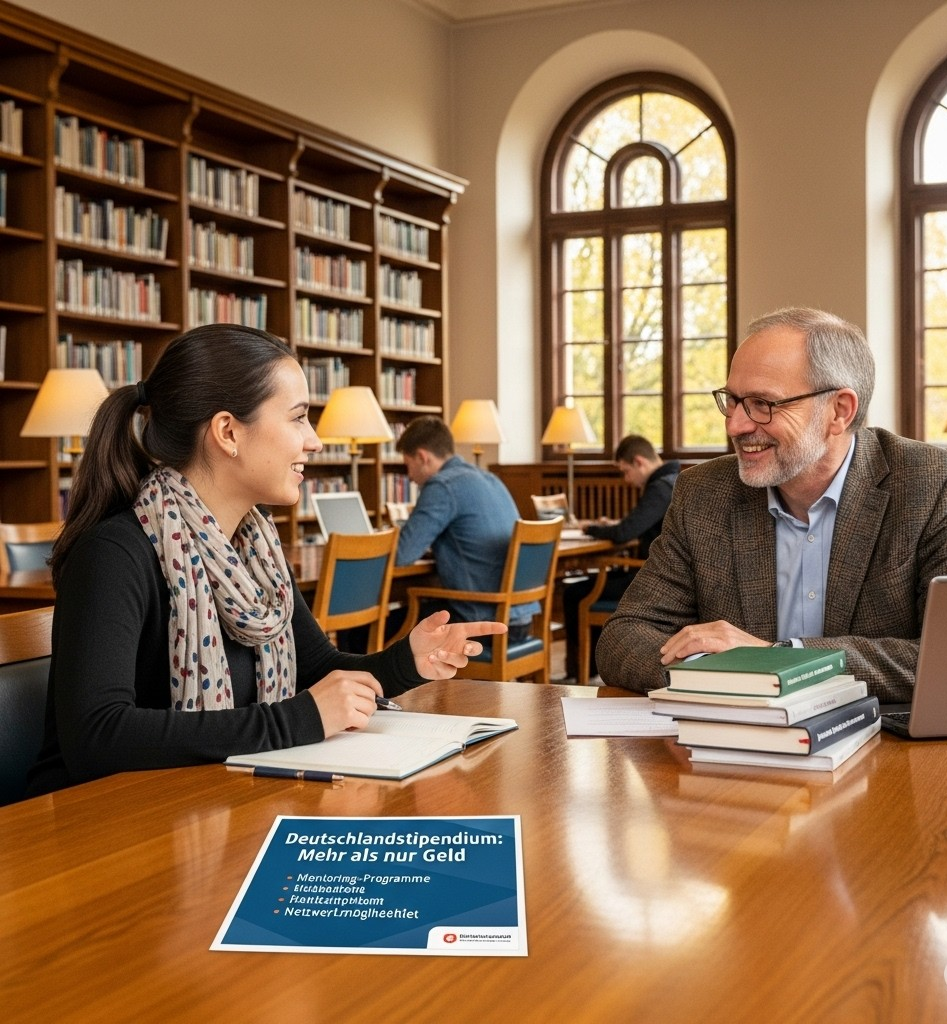Embarking on a higher education journey in Germany is a dream for many, but the cost of living can be a significant hurdle. This is where the German Deutschland Stipendium Scholarship 2026 comes in—a lifeline for talented students seeking to focus on their academic and personal growth without financial stress. This comprehensive guide is designed to provide you with the essential, actionable information you need to successfully navigate the application process. We’ll demystify the scholarship, from eligibility to the application itself, and give you the tools to craft a standout application. In my experience advising countless students, this scholarship, with its unique blend of merit and personal criteria, offers an incredible opportunity to truly thrive in Germany.

What Exactly Is the Deutschlandstipendium?
The Deutschlandstipendium is more than just financial aid; it’s a nationwide scholarship program established by the German Federal Government. It’s unique in that it’s co-funded by both the government and private sponsors—companies, foundations, or private individuals. This creates a powerful network that connects outstanding students with their future professional and personal communities. Official Program Information.
The scholarship provides €300 per month for at least two semesters, with the potential for renewal. This funding is not income-dependent, meaning it won’t be offset against other financial aid like BAföG. It’s designed to be a significant boost, allowing you to concentrate fully on your studies and pursue extracurriculars that enrich your academic career. Legal Basis and Regulations.
Eligibility: Are You the Ideal Candidate?
The Deutschlandstipendium is open to both domestic and international students who are enrolled or will be enrolling at a participating German university. The key is to be a current or prospective student at a university that offers the scholarship, as the application is made directly to the university, not a central body.
Here’s a breakdown of the key eligibility criteria you should know:
- Academic Performance: This is the core of the scholarship. The selection committees at universities are looking for students with excellent academic records. For new students, this means a strong grade in your university entrance qualification (like the Abitur) or your previous degree (e.g., Bachelor’s grade for Master’s applicants). For students already enrolled, your transcript of records will be heavily scrutinized.
- Social Commitment: This is a crucial “soft factor” that sets the Deutschlandstipendium apart. The scholarship values students who demonstrate a strong commitment to society. This can include volunteer work, political or social engagement, or leadership roles in student organizations.
- Personal Circumstances: Your personal background and life journey also play a significant role. The committee considers circumstances such as having a migration background, overcoming personal or family-related hurdles, or having care-giving responsibilities. This criterion ensures the scholarship is accessible to a wide range of deserving candidates who have persevered against challenges.
- Enrollment Status: You must be enrolled in a Bachelor’s or Master’s program at a German university and still be within your standard period of study. Most universities require you to have at least two semesters remaining in your degree.
The Application Process: A Step-by-Step Guide
The application for the Deutschlandstipendium is handled directly by each university. This is a critical point that many prospective applicants miss. You do not apply to a central government agency.
Step 1: Find a Participating University
The first step is to identify German universities that offer the scholarship and your desired program. Most public universities participate, but it’s essential to check the official website of your target university for their specific scholarship page and application details.
Step 2: Check the Application Period
Deadlines are set by each university and can vary widely. For the 2026 funding year, some universities might open applications in late 2025 (e.g., September/October) while others might do so in early 2026 (e.g., January). The funding period typically begins in the winter semester of 2026. Keep a close eye on your university’s official scholarship pages for announcements.
Step 3: Gather Your Documents
While the specific documents may vary slightly by university, you will almost certainly need the following:
- Application Form: An online or PDF form provided by the university.
- Proof of Grades: This is your academic transcript. For first-year students, this will be your university entrance qualification. For Master’s applicants, it’s your Bachelor’s degree certificate and transcript.
- Motivation Letter: This is your chance to shine and tell your story.
- CV (Curriculum Vitae): A tabular CV detailing your academic history, professional experience, and social engagement.
- Letters of Recommendation: Some universities may require a letter of recommendation from a professor or teacher.

Crafting a Winning Motivation Letter
This is arguably the most important part of your application. The motivation letter is where you connect the dots between your academic achievements, your social engagement, and your personal story. I’ve seen many applicants make the mistake of simply listing their accomplishments. A truly effective letter tells a compelling narrative.
- Be Specific: Don’t just say you have “good grades” or “volunteer.” Quantify your achievements. For example, “I achieved an average grade of 1.2 in my Bachelor’s degree” or “I volunteered over 100 hours at a local community center, leading a project to…”
- Connect the Dots: Explain why your past experiences have led you to this program and this scholarship. How will the €300/month stipend and the non-material support allow you to achieve your academic and personal goals?
- Demonstrate Your Commitment: This is where you bring your social engagement to life. Describe the impact of your volunteer work. What did you learn? How did it shape your worldview? Show, don’t just tell.
- Address Your Personal Circumstances: If you have overcome significant challenges, this is the place to explain them honestly and concisely. Frame it in terms of how it has strengthened your resolve and shaped your character, not as a request for sympathy.

The scholarship offers an accompanying program that includes networking events with sponsors and other scholars. This is a huge benefit and a unique selling point of the program. Mentioning your interest in these opportunities shows that you’ve done your research and are a genuinely engaged candidate.
Key Takeaways and Final Encouragement
Securing the Deutschland Stipendium Scholarship is a significant achievement that can transform your academic experience in Germany. It’s an investment in your talent, not just your grades. The application process, while specific to each university, is a manageable and rewarding exercise in self-reflection. I’ve seen firsthand how focusing on both your academic prowess and your personal journey is the winning formula.
Start early. Research the universities, understand their specific criteria, and begin drafting your motivation letter. The journey to a scholarship is a marathon, not a sprint, and every step you take brings you closer to your goal. Remember, the scholarship isn’t just about financial aid; it’s about joining a community of driven, socially-minded individuals who are shaping the future.
Fulbright FLTA 2026-2027: Teach and Study in the United States on a Fully Funded Scholarship
Your Complete Guide to the Chung Hwa Rotary Educational Foundation Academic Scholarship 2026
FAQ
Q1:Is the Deutschlandstipendium for international students only?
No, the scholarship is open to students of all nationalities, as long as they are enrolled or plan to enroll at a participating German university.
Q2:Does the scholarship cover tuition fees?
Since most German public universities do not charge tuition fees, the Deutschlandstipendium is a monthly stipend to help with living expenses. It does not cover tuition, as that is not the primary purpose of the funding.
Q3:Can I apply for the scholarship if I am not in Germany yet?
Yes, you can apply as a prospective student. However, you must be enrolled at the university by the time the funding period begins to receive the scholarship. The university will often ask you to provide proof of enrollment.
Q4:Is the scholarship paid directly to me or to the university?
The €300 stipend is paid directly to you on a monthly basis.










